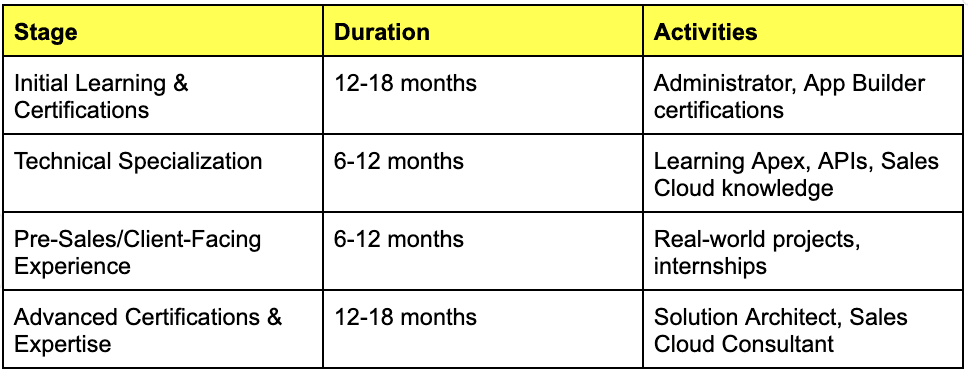Ah, the elusive Salesforce Solution Engineer—part technical wizard, part sales superhero. If you've ever been curious about how to blend the nitty-gritty technical side of Salesforce with the persuasive charm of sales, you’re in the right place. A Salesforce Solution Engineer is the vital link between technical solutions and business needs, helping organizations solve complex problems with Salesforce’s wide array of products.
Why Become a Salesforce Solution Engineer?
With Salesforce dominating the CRM market, there’s never been a better time to explore this role. The demand for Solution Engineers is skyrocketing as companies seek individuals who can not only understand the technical complexities of Salesforce but also communicate how those technical capabilities translate into real-world business value.
Skills and Qualifications Required
To become a successful Salesforce Solution Engineer, you need to wear many hats—and none of them can be too big or too small.
Technical Skills
Let’s start with the hard stuff. You’ll need a strong command of the Salesforce platform, including its multiple clouds like Sales Cloud, Service Cloud, and Marketing Cloud. You should also have a working knowledge of Apex (Salesforce’s proprietary language), Lightning components, and integrations through APIs.
Soft Skills
No matter how technically savvy you are, your ability to communicate will set you apart. Solution Engineers often translate highly technical ideas into simple business benefits. A knack for storytelling, excellent problem-solving, and an ability to perform under pressure are all crucial.

Education and Certifications Needed
Educational Background
While a degree in Computer Science or Information Systems is certainly useful, it's not a dealbreaker. Many successful Solution Engineers have backgrounds ranging from engineering to business, but what they all have in common is a deep understanding of the Salesforce platform.
Salesforce Certifications
Certifications are a key part of your journey. Start with the Salesforce Administrator certification to gain foundational knowledge. Then, move on to more technical certifications like Platform App Builder and Solution Architect.

Steps to Become a Salesforce Solution Engineer
Becoming a Salesforce Solution Engineer is a journey that blends learning, practice, and hands-on experience.
Build a Strong Foundation
Begin by learning the basics of the Salesforce platform. The Admin and App Builder certifications will help you understand how Salesforce operates at both a functional and technical level.Develop Technical Expertise
Master Apex, SOQL, and Lightning components. Learn how to integrate Salesforce with third-party tools using APIs and middleware.Gain Pre-Sales and Client-Facing Experience
Solution Engineers work closely with clients, so gaining experience in pre-sales roles or customer-facing projects is critical. Volunteer for projects where you can present technical solutions.Advance with Specialized Certifications
Once you’re comfortable with the basics, dive into specialized certifications such as Sales Cloud Consultant and Solution Architect.Network and Build a Portfolio
Attend Salesforce events, network with professionals in the field, and build a portfolio of successful solution implementations.
Timeline to Become a Salesforce Solution Engineer
How long does it take to become a Solution Engineer? That depends on your prior experience and the time you can dedicate to learning.

Building Hands-On Experience
Working on Salesforce Projects
To gain real experience, consider internships, freelance projects, or participating in Salesforce hackathons. Many aspiring Solution Engineers volunteer with non-profits that use Salesforce to help with their implementations, which is a great way to get your hands dirty.
Participating in Salesforce Communities
Joining the Trailblazer community is a fantastic way to connect with other Salesforce professionals, share knowledge, and stay updated on the latest trends. Events like Dreamforce provide an opportunity to learn from the best in the business.
Creating a Portfolio
Showcase your skills by compiling case studies of projects you’ve worked on. If you’ve designed a custom solution that improved a sales process or integrated Salesforce with another system, document it!
Common Challenges Faced by Aspiring Solution Engineers
1. Balancing Technical and Sales Skills
Many Solution Engineers struggle with balancing technical prowess and sales acumen. The trick is to always focus on how the technical solution benefits the business, not just how cool the technology is.
2. Keeping Up with Salesforce Updates
Salesforce is constantly evolving. You’ll need to regularly study release notes and participate in training to stay ahead.

Career Path and Growth Opportunities
Once you’re a certified Salesforce Solution Engineer, the sky’s the limit. You could advance to Senior Solution Engineer roles or even become a Salesforce Architect. The earning potential is also promising. Know the average salary of a Salesforce Solution Engineer from here.
Becoming a Salesforce Solution Engineer is a rewarding and challenging career path that blends technical skills with business strategy. Whether you’re just starting out or transitioning from another Salesforce role, the steps outlined above will guide you in your journey. Stay committed to learning, network with industry pros, and never stop refining your ability to translate complex technical concepts into business value.
With the right mix of certifications, hands-on experience, and client-facing exposure, you'll be well on your way to becoming the go-to Solution Engineer every organization needs.





